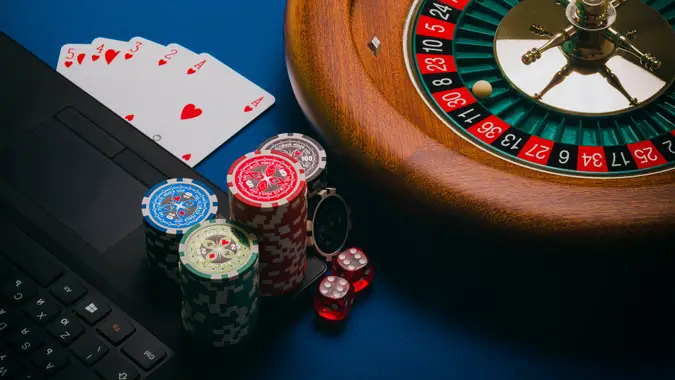Online Casino Gambling: The Impact on the Mind and Body
In a world where there are eu casinos that accept uk players, being immersed in gambling creates a unique experience. But what happens to the player inside, both psychologically and physiologically?
Beyond the impressive graphics and sounds of gambling online lies a complex interplay between the gambler’s body and mind. Gambling may be a form of entertainment, but it carries with it a number of effects both on mind and body that extend beyond simply financial gains or losses.
Let’s take a look at the intricate ways in which online gambling can affect both the physical well-being and the mental health of individuals. From the adrenaline-fuelled highs to the potential pitfalls and the impact they can have on your mental health, we’ll attempt to shed light on the physiological and psychological dimensions of this new age way to gamble.


Brief Introduction to Online Gambling In UK and Europe
European casinos that accept players from the UK offer many advantages. They have a high level of security, reliability and honesty. They provide a wide range of games, bonuses and promotions. They support a variety of currencies and payment methods. They also have licences from reputable regulators such as the Malta Gambling Commission, the UK Gambling Commission and others.
UK players can enjoy the excitement at these casinos without worrying about legal implications. As of 2021, the UK has left the European Union, but this has not affected the right of its citizens to play at online casinos registered in Europe. This means that players from the UK are free to choose any European casino that accepts them and benefit from its services.
Excitement and Passion: How Gambling Works
Gambling can have various effects on both the body and mind. The impact can be influenced by factors such as the frequency of gambling, the amount of money involved, individual susceptibility, and the types of games played.
When we gamble, our brain releases various chemicals that affect our mood, motivation and behaviour. These substances are called neurotransmitters, and they transmit signals between nerve cells. The two main neurotransmitters that are associated with excitement are dopamine and serotonin.
Dopamine is a neurotransmitter that is associated with pleasure, reward, and enjoyment. When we win at a game of chance, our brain releases dopamine and we experience feelings of happiness and fulfilment. This encourages us to keep gambling to get even more dopamine. However, when we lose, our dopamine levels drop and we feel frustrated and sad. This can cause us to play even more to restore dopamine levels and avoid negative emotions.
Serotonin is a neurotransmitter that is linked to mood, appetite, sleep and social behaviour. When we gamble, our brain also releases serotonin and we experience feelings of relaxation and calmness. This helps us cope with the stress and anxiety that can occur while gambling. However, if we play too much or too often, serotonin levels can drop and we can become depressed, irritable or anxious. This can lead us to seek other sources of serotonin such as alcohol, drugs or unhealthy food choices.
It’s important to note that while some individuals can engage in gambling without significant negative consequences, others may be more susceptible to the harmful effects. Seeking professional help, such as counselling or therapy, is crucial for those struggling with the adverse impacts of gambling on both their physical and mental well-being.


Physiological Responses to Gambling
When we gamble, our body also reacts to the different situations that occur during the game. Our heartbeat, blood pressure, temperature, sweating, and other physiological parameters change depending on how we feel and how we act. Let’s take a look at a table that shows what physiological reactions occur at different moments of the game.
| Moment of the game | Heartbeat | Pressure | Temperature | Sweating |
| Start of play | Increases | Increases | Increases | Increases |
| Winning | Increases strongly | Strongly increases | Strongly increases | Strongly increases |
| Losing | Decreases | Decreases | Decreases | Decreases |
| Continued play | Fluctuates | Fluctuates | Fluctuates | Fluctuates |
| End of game | Normalised | Normalised | Normalised | Normalised |
As you can see, gambling affects our physiology and this can have both positive and negative effects. It’s important to know how to control your body and gamble in moderation so as not to upset the balance of your physiological systems and risk your health.


Psychology of Virtual Casinos
When we gamble online, we’re not only interacting with the games, but also with the casino itself. Online casinos create unique psychological strategies to captivate and hold a player’s attention. Let’s take a look at what factors influence our psychology at a virtual casino.
One such factor is the design of the site. Online casinos that accept UK players try to create an attractive, user-friendly and functional design that suits the casino theme and player tastes. They use bright colours, animations, sounds, logos and other graphics/elements to create an atmosphere of excitement and fun.
Another factor is bonuses and promotions. Online casinos that accept UK players offer different types of bonuses and promotions to attract and encourage players. These can include bonuses for registration, for first deposit, for loyalty, for referrals, for playing on certain days or hours, for participating in tournaments or lotteries and others.
Online casinos that accept UK players provide constant feedback to players to keep them interested and motivated. They can use different ways such as messages, notifications, ratings, reviews, chats, social media and others.


Positive Effects of Online Gambling
While gambling is generally associated with potential risks and negative consequences, some argue that there can be certain positive impacts. It’s crucial to note that these potential benefits are context-dependent and may not apply universally.
Entertainment and Socialisation
For many people, gambling is a form of entertainment and a way to socialize. Engaging in activities like playing poker or visiting a casino can provide a social outlet for those that may otherwise lead a solitary life.
Stress Relief and Relaxation
Some individuals find that gambling can act as a stress-relief mechanism and a way to unwind. Enjoying a game of chance or skill can provide a break from daily stressors.
Skill Development
Certain forms of gambling, such as poker or blackjack, involve strategy and skill. Engaging in these games may enhance cognitive abilities, including decision-making, strategic thinking, and mathematical skills.
Financial Gain
While winning is not guaranteed in gambling, some individuals experience financial gains, particularly in games that involve skill and strategy. This can contribute positively to one’s financial situation, which in turn can create a more positive life that allows you more resources to take care of your mental and physical health.
Community Engagement
Various online communal gambling games, live dealer games, bingo nights, charity casino events, and other community-based gambling activities can foster a sense of community and camaraderie. Such events may also serve as fundraisers for charitable causes.
Enhanced Mood and Excitement
Winning, even in small amounts, can trigger the release of dopamine, a neurotransmitter associated with pleasure and reward. This can create a temporary positive mood and a sense of excitement.


Potential Negative Effects of Gambling Online
While there are a number of positive aspects of gambling, it’s important to recognise and monitor some of the potential negative consequences of gambling that some people that are susceptible may be prone to based on their individual circumstances. Keeping you gambling in check will allow you to prevent some of the following negative effects.
Stress and Anxiety
Gambling can induce stress and anxiety, particularly during periods of uncertainty, such as waiting for the outcome of a bet or facing financial losses. If you find yourself constantly stressed or anxious, you may be gambling too often or for too long of periods.
Sleep Disturbances
Excessive gambling or the stress associated with it can lead to sleep disturbances, including insomnia and irregular sleep patterns. If you aren’t getting enough sleep or cannot seem to complete necessary daily tasks, it may be time to reduce your online gambling.
Physical Health Issues
Chronic stress from gambling may contribute to physical health issues such as headaches, digestive problems, and cardiovascular concerns. In some cases, individuals may turn to substances like alcohol or drugs as a way to cope with the stress and emotional turmoil associated with gambling.
Psychological Distress
Losses or the fear of losing can contribute to feelings of guilt, shame, depression, or even suicidal thoughts. The anticipation of winning may lead to heightened excitement and impulsivity. Problem gamblers often experience cognitive distortions, such as irrational beliefs about luck, the illusion of control, and the gambler’s fallacy that believing past events will influence future outcomes.
Social Isolation
Gambling addiction can contribute to social isolation as individuals may withdraw from family, friends, and social activities to spend more time gambling. Problem gambling can strain relationships, leading to conflicts, breakdowns in communication, and a lack of trust among family and friends if you neglect them due to unhealthy gambling addiction.


Gambling is an impressive form of entertainment which allows people to experience many emotions and sensations. As we’ve learned, playing online casinos affect the body in many ways. We’ve seen how gambling affects our psyche, our brain and our body. We also see how online casinos use different psychological strategies to attract and keep our attention. We should never forget that gambling requires responsibility and rationality.




















